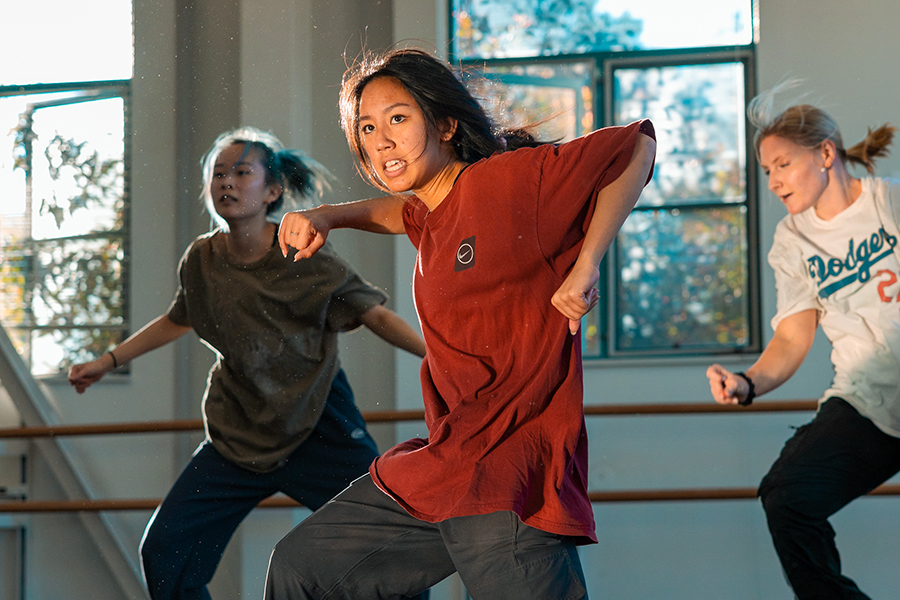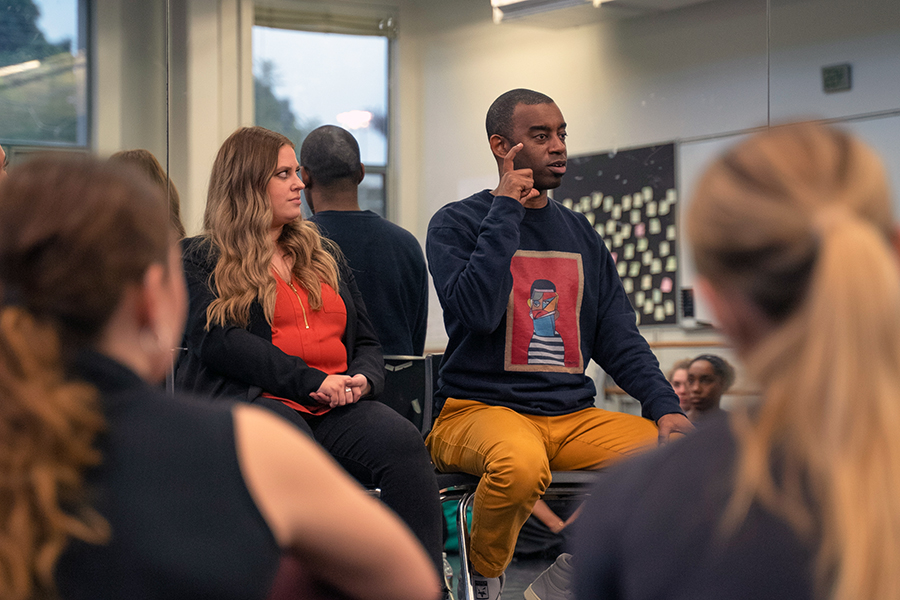
Geri Brown hails from a family of accomplished dancers and performing artists, all of whom have fought against adversity in careers on Broadway, film, and television. Now, as a successful storyteller, writer, educator, producer, and entrepreneur, Brown has devoted her career to encouraging equity in the arts and supporting the next generation of performers. This unwavering effort to remove barriers is what brought her to join LMU Dance this semester as a visiting artist, where she is working to strengthen the department’s connection to the L.A. commercial dance industry as well as assisting in decolonizing the curriculum.

Early on, Brown realized that, as a Black queer women who did not easily fit into identity tropes, some puzzled on where she could fit into their stories. “A lot of folks just didn’t know what to do with me, and wouldn’t allow me to be the Black artist I wanted to be,” she says. These experiences inform her two-fold focus at LMU: contributing to the department curriculum so that it better reflects the values of diversity, equity, inclusion, accessibility and justice; and leveraging her status within the commercial dance and entertainment industry to increase opportunities for students after they graduate. The product of these efforts will be on display April 28th at the inaugural LMU Dance Senior Showcase.
Brown has founded three dance education organizations focusing on building an industry where everyone belongs: Liberate Artists, a dance and performing arts company that promotes self-confidence and growth in young people; Always, Enough Foundation, aiming to break economic barriers that keep children from entering dance; and Dance Education Equity Association, which promotes safe, equitable and inclusive dance spaces. She also serves in an advisory position on DEIAJ and fundraising for the newly established Choreographers Guild, and is founder and executive producer of Boundary Issues Media, a production company telling stories through the lens of underrepresented identities.
“We’re challenging these notions in the classroom so our students can promote these ideas after they graduate.”
“In an increasingly polarized world, dance is an opportunity to teach compassion through movement,” Brown says. “Once we understand that we all deserve to be here in the skin and body we’re in, we can be more open to having conversations and being in community with folks who are different from us.”
Brown is at the forefront of an effort to reconceptualize the commercial dance industry. “Traditionally, people from marginalized backgrounds have been told they can only be in certain roles or pieces,” she says. “Through the decolonization of dance, we can build a new generation of decision makers who think about dance in different ways. We’re already seeing the industry opening doors for people who haven’t traditionally fit into the dance world because they’re disabled, have different body shapes, or are people of color.”

As part of her efforts to decolonize the curriculum at LMU, Brown has instituted community agreements outlining how dancers and choreographers will work together. She introduced a weekly commercial dance series in which students work with a videographer to apply the artistry cultivated at LMU, and guest speakers who have choreographed some of Hollywood’s biggest TV and film productions discuss their vision of a reimagined industry. “We’re challenging these notions in the classroom so our students can promote these ideas after they graduate,” Brown says. “We want them to keep that social justice lens, entering the industry with an understanding of their self-worth.”
Brown has used her close ties within Los Angeles’ commercial dance industry to provide opportunities for students — facilitating auditions for representatives from top talent agencies, as well as bringing in producers and casting directors for students to network and build relationships.
Many of these industry professionals will be on hand for the first LMU Dance Senior Showcase, co-produced by Brown and Taryn Vander Hoop, an assistant professor in the department, with contributions from other faculty members as well as three outside choreographers. Through their performances, the seniors will tell a story of their time at LMU, ending with the legacy they hope to leave through their work in the industry. A brunch prior to the performance will allow the students to network with attendees.
Brown says the work she has undertaken at LMU Dance wouldn’t be possible without the support she has received from the department, most notably the chair, Rosalynde LeBlanc Loo, Senior Administrative Coordinator, Alessa Meni, and dean of the LMU College of Communication and Fine Arts Bryant Keith Alexander. “LMU’s social justice lens makes it the perfect place to advance this new frontier,” Brown says. “I couldn’t see doing this work at any other university.”
To learn more about LMU Dance and the upcoming Senior Showcase, click here.



